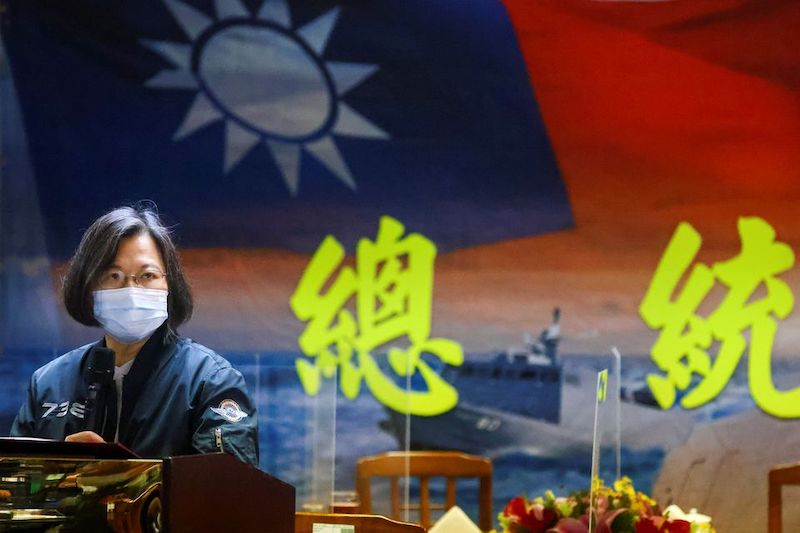As vaccine tensions rise, some in Taiwan head to mainland China for a jab


Vaccines have become the latest source of tension between Beijing and Taipei, as the self-ruled island grapples with its worst outbreak of Covid-19 and a shortage of doses.
Taiwan had been a success story for its handling of the pandemic but a sudden surge in cases since April has had the authorities scrambling to secure vaccines for its population of 23.5 million.
Beijing has offered to send Chinese vaccines to Taiwan, which it sees as part of its territory. But Taiwanese President Tsai Ing-wen rejected that offer – and a proposal for residents to get the jab at mainland airports – because of safety and efficacy concerns.
That has angered Beijing, its Taiwan Affairs Office spokesman Ma Xiaoguang saying on Monday that Tsai had “ignored the goodwill from the mainland and politicised the vaccine shortage problems”.
Shipments have instead started to arrive from elsewhere – including 2.5 million doses from the US – further annoying Beijing.
[embed]https://www.youtube.com/watch?v=WAyYrXH_0OA[/embed]
As the accusations fly, some residents are taking up Beijing’s offer anyway, by travelling to the Chinese mainland to get a jab. But a travel agent arranging those trips says most who go have a mainland connection, and it could be too costly otherwise.
Emily Huang is one of them. The mainlander in her 40s has been living in Taiwan for more than two decades and is married to a local. She went back to her hometown in Henan province soon after the outbreak began – spending 21 days in isolation, including 14 nights in hotel quarantine that she paid for herself – saying she was concerned and did not want to wait.
“I’ve already had two doses of the vaccine … while Taipei and Beijing are still squabbling,” she said.
Taiwan has been battling an island-wide outbreak . The situation worsened in May when it reported double-digit case numbers for the first time and it hit a record of 723 new cases in a single day on May 22, but numbers have been going down since then. So far, Taiwanese officials have reported 605 deaths – more than 590 of them since late April.
The island’s success in containing the virus had until now meant many people were reluctant to get vaccinated. Demand has grown as the case numbers worsened, but there are not enough vaccines.
Just 0.1 per cent of the population had been fully vaccinated as of Wednesday, according to official data.
[embed]https://www.youtube.com/watch?v=kgTqgarKzZw[/embed]
So far the island has received 3.7 million doses from allies – including the US vaccines and 1.2 million from Japan. Lithuania has pledged 20,000 AstraZeneca doses and a Buddhist group has said it would buy 5 million doses of the BioNTech vaccine, as has Foxconn founder Terry Gou .
Taiwanese drug makers are also working on their own vaccines, two of which are in phase 2 trials.
Meanwhile, a row has also erupted over access to the BioNTech drug, with Tsai accusing Beijing of blocking a deal to buy the vaccine directly from the German firm. Beijing claims Taipei is free to buy doses from Shanghai Fosun Pharmaceutical Group, which has distribution rights in mainland China, Hong Kong, Macau and Taiwan.

For some in Taiwan, heading across the strait is the answer. As of June 11, 62,000 Taiwanese residents had been vaccinated on the mainland, according to the Taiwan Affairs Office.
But Alice Yang, a travel agent with Yen Lin International Travel Agency in Taipei who has been arranging vaccination trips for residents, said many of her clients had a link to the mainland.
“Most of the people who are willing to go to the Chinese mainland are mainlanders who have married Taiwanese,” Yang said. “So they have relatives and friends in China who can help them sort out problems and they can save money by staying with them for the final seven days of quarantine.”
Taiwanese businesspeople were another major group, according to Yang. “They have to go back to the Chinese mainland for their businesses … so they get the vaccine while they’re there,” she said.
[[nid:531438]]
But she said it would be financially harder for Taiwanese without that connection.
The cost was a key reason Taipei resident Tung Chia-hui said she would not make the trip to get vaccinated. “I won’t go unless all of my travel – including the flights and hotel costs – is paid for,” she said.
Another big reason putting people off Chinese vaccines was mistrust of official data on the mainland, according to Jonathan Tong, president of the China Foundation, a cultural organisation in Taipei.
“Many Taiwanese … don’t fully believe the trial data provided by the Chinese side, even though they know the Chinese vaccines have been listed by the World Health Organization ,” he said.
This article was first published in South China Morning Post.